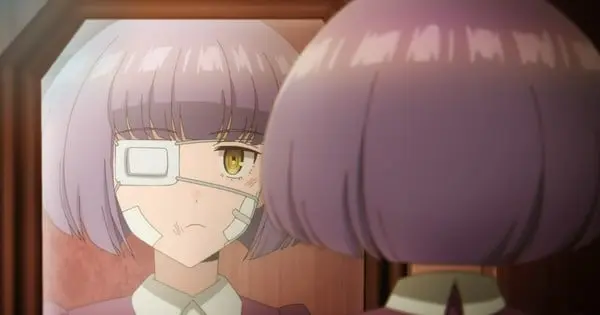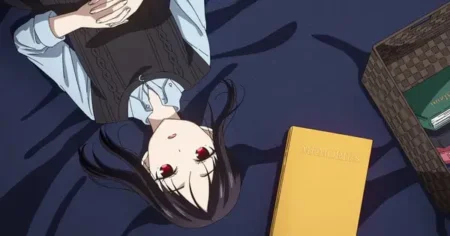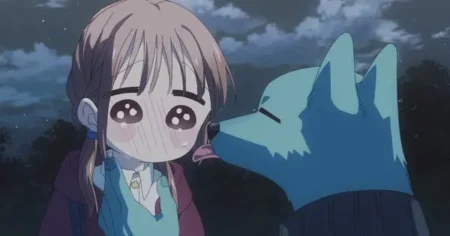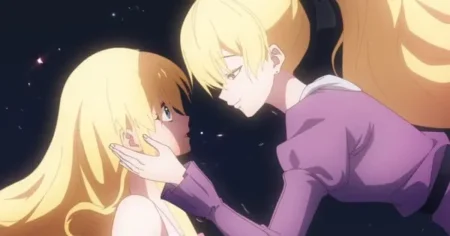The anime adaptation of “Tasokare Hotel,” a mystery mobile game by Benoma Ray and SEEC, concluded its first season in March 2025. Set in a liminal space between life and death, the series follows Neko Tsukahara as she navigates the enigmatic Tasokare Hotel, helping guests regain their memories and decide their fate. While the anime garnered attention for its unique premise and engaging storytelling, the season finale left viewers with mixed feelings, sparking discussions about its execution and overall impact.
A Twilight World: The Premise of Tasokare Hotel
“Tasokare Hotel” introduces a captivating concept: a hotel existing in perpetual twilight, serving as a sanctuary for souls uncertain about their transition to the afterlife or return to the living world. Guests arrive at the hotel with fragmented memories, their identities obscured until they uncover the truth behind their presence. Neko Tsukahara, the protagonist, finds herself in this twilight realm with no recollection of her past. Guided by the hotel staff, she embarks on a journey to piece together her identity and assist other guests in resolving their unfinished business.
Episode 12: A Contentious Conclusion
The final episode of “Tasokare Hotel” attempts to tie up loose ends and deliver a resolution to the overarching plot. However, its execution has been met with criticism from viewers and critics alike. The episode sees Neko held responsible for the Atori and Masaki situation, leading to her dismissal from the hotel. This drastic turn of events, with three main characters exiting the hotel, is handled with a surprising lack of emotional weight, leaving viewers underwhelmed.
Lore Dump and World-Building Overload
The finale is also criticized for cramming an excessive amount of lore and world-building into a single episode. Instead of gradually unfolding the mysteries of the Tasokare Hotel, the episode throws a barrage of information at the audience, resulting in a disjointed and confusing narrative. This last-minute exposition feels forced and detracts from the emotional impact of the finale.
Plot Contrivances and Unanswered Questions
Several plot contrivances further mar the finale’s quality. Kiriko’s sudden revelation about his past and the convenient appearance of a hell-summoning box raise questions about their purpose and integration into the story. The lack of foreshadowing and explanation for these elements makes them feel like haphazard additions to an already convoluted plot.
The Climactic Confrontation: A Disappointing Showdown
The final confrontation between Neko and Masaki, intended to be a battle of wits, falls short of expectations. Neko and Masaki both succumb to obvious ploys, undermining their intelligence and diminishing the impact of the scene. The animation during this crucial moment is also criticized for being choppy and lacking visual flair.
A “Silly Conclusion”?
One critic described the finale as delivering “an extremely silly conclusion,” which, while perhaps disappointing for a stronger series, felt fitting for a show that “never found its footing”. The episode’s resolution, with Masaki condemned and Atori spared, feels rushed and unsatisfying. While Neko returns to the living world, the possibility of her eventual damnation adds a bittersweet note to the ending.
Themes and Interpretations
Despite its flaws, the “Tasokare Hotel” finale touches upon several intriguing themes:
Liminality and Transience
The Tasokare Hotel itself represents a liminal space, a threshold between life and death. The characters’ temporary stay in the hotel underscores the transient nature of existence and the importance of resolving one’s past before moving on.
Memory and Identity
The core concept of the series revolves around the importance of memory in shaping identity. The guests’ struggle to regain their memories reflects the human need to understand their past and find meaning in their existence.
Morality and Redemption
The finale explores themes of morality and redemption, as Neko confronts Masaki and ultimately contributes to his damnation. However, the series also raises questions about the complexities of morality, as Neko herself may face consequences for her actions.
Reception and Impact
The “Tasokare Hotel” anime garnered a mixed reception overall. While some viewers appreciated its unique premise and engaging characters, others criticized its pacing, animation quality, and convoluted plot.
Criticisms
- Underdeveloped Characters: Several reviews noted that the characters, while likable, were underutilized and underdeveloped.
- Weak Mystery Elements: As a mystery series, the stories were considered neither complex nor compelling enough.
- Visual Deficiencies: The anime’s visuals were often described as “flat and generic,” lacking the flair and dynamism to elevate the story.
- Uneven Pacing: The pacing of the series was criticized for being slow and meandering, with the finale feeling rushed and overstuffed.
Positives
- Unique Premise: The concept of a hotel between life and death, where guests regain their memories, was praised for its originality and potential.
- Engaging Characters: Despite their flaws, the characters were generally considered likable and relatable, drawing viewers into their stories.
- Atmospheric Setting: The Tasokare Hotel itself was lauded for its art nouveau influence and 1920s style design, creating a distinct and immersive atmosphere.
Comparisons to Other Works
Many reviewers drew comparisons between “Tasokare Hotel” and other anime series with similar themes, such as “Death Parade” and “Danganronpa.” While “Tasokare Hotel” shares elements with these shows, it ultimately fails to reach the same level of emotional depth and narrative complexity.
Is a Second Season Possible?
As of March 2025, there has been no official announcement regarding a second season of “Tasokare Hotel.” However, given the positive reception of the first season and the existence of a sequel to the mobile game (“Tasokare Hotel: Tsubomi”), a continuation is possible. One analysis speculates that a second season could be released sometime in mid-2026.
Adaptations and Related Media
“Tasokare Hotel” has spawned several adaptations and related media, including:
- Mobile Game: The original “Tasokare Hotel” mobile game was released in 2017 and has been downloaded over 1.1 million times.
- Remake: A remake titled “Tasokare Hotel Re:newal” was released in 2022 for iOS and Android, with a PC port in 2024.
- Manga: A webtoon adaptation began serialization online in December 2024.
- Stage Play: A stage play adaptation is set to run in Ueno’s Hikosen Theater from April 24 to May 4, 2025.
- Sequel Game: A sequel to the game, titled “Tasokare Hotel: Tsubomi” is slated for release in August 2025.
Concluding Thoughts
The season finale of “Tasokare Hotel” presents a mixed bag of resolutions and missed opportunities. While the series established an intriguing premise and engaging characters, its execution faltered in the final stretch. Nevertheless, “Tasokare Hotel” remains a unique and thought-provoking anime that explores themes of memory, identity, and the human condition within a captivating twilight realm. Whether or not a second season materializes, the “Tasokare Hotel” anime has left its mark on the mystery and supernatural genres, prompting discussions and inspiring fan theories about its enigmatic world.









